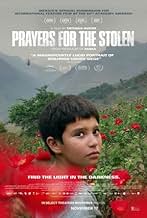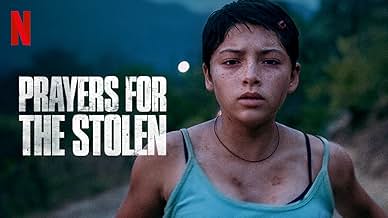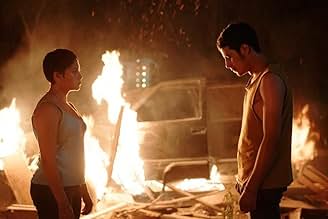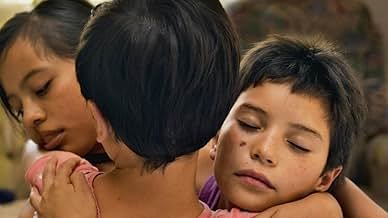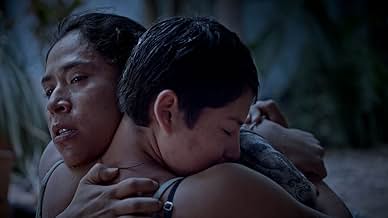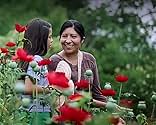AVALIAÇÃO DA IMDb
7,3/10
4,4 mil
SUA AVALIAÇÃO
A vida numa cidade em guerra, vista através dos olhos de três jovens no seu caminho para a adolescência.A vida numa cidade em guerra, vista através dos olhos de três jovens no seu caminho para a adolescência.A vida numa cidade em guerra, vista através dos olhos de três jovens no seu caminho para a adolescência.
- Direção
- Roteiristas
- Artistas
- Prêmios
- 23 vitórias e 36 indicações no total
- Direção
- Roteiristas
- Elenco e equipe completos
- Produção, bilheteria e muito mais no IMDbPro
Avaliações em destaque
Tatiana Huezo Sánchez who is best known for her documentaries, turns her attention to fiction with a coming of age drama based on Jennifer Clement's novel of the same title. It tells the story of Ana and her two best friends who discover a shocking reality - and a hostile world amidst the drug trafficking in Mexico. It gives a personal touch to something we hear at a distance on the internet. From the first moments of the film, Tatiana chooses to film this through the details, her camera focussing on the minutiae of the environment. She plunges us into an peaceful atmosphere, behind the lush green setup, we feel a discomfort and a lively tension underlying between the villagers. They depends on poppy harvest to make ends meet. There are semi-detached houses with hiding place and girls are made to sport boyish haircuts to escape from the eyes of human traffickers. There is absolutely no hope for the little girls and they tend to get worse as time goes on.
Initially, I was just expecting another usual documentary with realism tag, while storyline does follow the formula, its the treatment that appealed. It has a lot more than one would expect. It seems like a tearjearker war film, but when you dive into it you'll likely see a different pov. The pacing is easy and there is no rush on Tatiana's behalf to get to 'the story', as it were, but rather a strong sense of atmosphere and indulges the viewer through this lack of urgency. It contains an atmospheric and evocative cinematography by Dariela Ludlow Deloya. It is supported with subtle score by Jacobo Lieberman and Leonardo Heiblum. As well as adequate sound design by Lena Esquenazi.
Overall, it is a great proof that this film depicts childhood and adolescence of three girls is by no means exaggerated. It's blends early Jorge Silva, Marta Rodríguez, Alanis Obomsawin's style and is almost like a companion piece to Identifying Features (2020) and Birth Certificate (1961); both thoroughly bleak and does scream for help with no chance for hope.
Initially, I was just expecting another usual documentary with realism tag, while storyline does follow the formula, its the treatment that appealed. It has a lot more than one would expect. It seems like a tearjearker war film, but when you dive into it you'll likely see a different pov. The pacing is easy and there is no rush on Tatiana's behalf to get to 'the story', as it were, but rather a strong sense of atmosphere and indulges the viewer through this lack of urgency. It contains an atmospheric and evocative cinematography by Dariela Ludlow Deloya. It is supported with subtle score by Jacobo Lieberman and Leonardo Heiblum. As well as adequate sound design by Lena Esquenazi.
Overall, it is a great proof that this film depicts childhood and adolescence of three girls is by no means exaggerated. It's blends early Jorge Silva, Marta Rodríguez, Alanis Obomsawin's style and is almost like a companion piece to Identifying Features (2020) and Birth Certificate (1961); both thoroughly bleak and does scream for help with no chance for hope.
10aarpcats
Watching this movie reminded me of the blurry photographs of British children playing in the ruins of London during the Blitz. If a building were bombed today, the unsafe structure would be guarded by cops to keep the children from being buried in the rubble. But, when the city is being bombed every night, what's the difference in whether a child dies from bombíng or under a pile of loose bricks? War brings death and death becomes normal.
In the bucolic and gorgeous mountains of Jalisco, war is constant and unending. Flickering fire flies have been replaced by the lights of cell phones as villagers try desperately to get a call "to the other side" for money to leave. Staying means enslavement to the cartel and losing your daughters to brutal sex trafficking. Instead of bombs, the cartels and the useless police rain terror on the adults in the village. Everyone knows a dead girl, and everyone knows how to harvest opium. And everyone knows to run when the US helps Mexico spray chemicals on the poppy crops.
Yet, just as the London kids entertained themselves with soccer, school, story telling and friendships, so too do the children in the village in Jalisco. What terrifies their parents simply is business as usual to them. They can't help growing up in war, but they are growing up. They want to dance, go to rodeos, date - every day things that are death defying in Jalisco.
It's an excellent movie about how the human spirit survives the unthinkable.
I want to tie Americans to chairs to help them understand exactly what American drug habits, the War on Drugs and the crisis in Central America is doing to desperate, terrified people. I want them to understand that they aren't coming heee for handouts. I want them to understand that they are coming here to stay alive. I want them to see children burned with American pesticides.
The acting is astonishing, the cinematography brilliant and the story heartbreaking. And this story happens every day in Mexico.
In the bucolic and gorgeous mountains of Jalisco, war is constant and unending. Flickering fire flies have been replaced by the lights of cell phones as villagers try desperately to get a call "to the other side" for money to leave. Staying means enslavement to the cartel and losing your daughters to brutal sex trafficking. Instead of bombs, the cartels and the useless police rain terror on the adults in the village. Everyone knows a dead girl, and everyone knows how to harvest opium. And everyone knows to run when the US helps Mexico spray chemicals on the poppy crops.
Yet, just as the London kids entertained themselves with soccer, school, story telling and friendships, so too do the children in the village in Jalisco. What terrifies their parents simply is business as usual to them. They can't help growing up in war, but they are growing up. They want to dance, go to rodeos, date - every day things that are death defying in Jalisco.
It's an excellent movie about how the human spirit survives the unthinkable.
I want to tie Americans to chairs to help them understand exactly what American drug habits, the War on Drugs and the crisis in Central America is doing to desperate, terrified people. I want them to understand that they aren't coming heee for handouts. I want them to understand that they are coming here to stay alive. I want them to see children burned with American pesticides.
The acting is astonishing, the cinematography brilliant and the story heartbreaking. And this story happens every day in Mexico.
Yikes but this is quite a difficult film to watch. It's centred around three teenage girls who live amidst the poppy fields of Mexico. "Ana" (Maria Membreño) "Paula" (Alejandro Camacho) and "Maria" (Giselle Barrera Sánchez) try to live their lives as normally as they can, but the fact that their school teacher is leaving because he won't pay protection money to the drug pedlars gives us some indication of the society in which they live. Indeed, it's this teacher who raises the issue of a missing girl - and that enlightens us to the fact that once they reach a certain age, these young women have other "uses" and nobody dares speak out about it. The chronology flits between the current life of these three and their younger childhood and illustrates that for them, there is little hope of change unless they are prepared to leave - but that they don't want to do with out each other or their mothers (the fathers don't feature at all in this drama). The rather courageous role of motherhood is really well exemplified by Mayra Batalla's contribution as "Rita". A woman who treats her daughters first menstruation with a dread that the young girl does not yet appreciate the significance of. It's a beautifully photographed vicious circle, with the emphasis on vicious. There are attempts at government interventions, local troops stationed and helicopters depositing toxins on the flowers, but the thrust here from director Tatiana Huezo is of a cycle of depressing and dangerous inevitability that it is difficult to see a way out of. The three young actors perform evocatively here offering us quite emotional and poignant characterisations. They are not simply going to give up - but it's not that simple. Harrowing, yes, but it's clearly been written and presented offering hope for the girls and to raise some awareness of the fact that as long as the West keeps buying the stuff, these people will live in a modern day slavery that turns your stomach.
Shedding light on the fearful existence & perilous life that women & children are forced to live in Mexican towns ravaged by drug trade, cartel violence & human trafficking, Prayers for the Stolen (Noche de fuego) captures this brutal reality through the coming-of-age journey of a young girl & her two best friends and makes for a gritty, affecting & heartbreaking slice of social realism.
Written & directed by Tatiana Huezo in her feature film debut, the film benefits from her earlier efforts as a documentarian as she utilises a similar raw style & uncompromising approach that adds a realistic touch & unflinching quality to the drama and allows it to unfold at its own pace while remote setting, grim atmosphere & sincere performances further strengthen the material.
However, the emotional impact the film was aiming for doesn't translate as well as it should've, for much of the plot remains uneventful, some scenes drag on for too long while others are cut earlier than expected, thus resulting in a picture that's harsh & harrowing in bits n pieces yet is unable to get under the skin. The film presents the difficult state of affairs but doesn't truly dig into it.
Overall, Prayers for the Stolen explores friendship, endurance, loss of innocence, cartel terror & endemic violence to give the audience an insight into the dark side of modern-day Mexico, and begins Huezo's feature filmmaking endeavours on a promising note if not a rewarding one. The performances are strong & gripping but the characters & situations depicted still required more development & fine tuning. Worth a shot anyway.
Written & directed by Tatiana Huezo in her feature film debut, the film benefits from her earlier efforts as a documentarian as she utilises a similar raw style & uncompromising approach that adds a realistic touch & unflinching quality to the drama and allows it to unfold at its own pace while remote setting, grim atmosphere & sincere performances further strengthen the material.
However, the emotional impact the film was aiming for doesn't translate as well as it should've, for much of the plot remains uneventful, some scenes drag on for too long while others are cut earlier than expected, thus resulting in a picture that's harsh & harrowing in bits n pieces yet is unable to get under the skin. The film presents the difficult state of affairs but doesn't truly dig into it.
Overall, Prayers for the Stolen explores friendship, endurance, loss of innocence, cartel terror & endemic violence to give the audience an insight into the dark side of modern-day Mexico, and begins Huezo's feature filmmaking endeavours on a promising note if not a rewarding one. The performances are strong & gripping but the characters & situations depicted still required more development & fine tuning. Worth a shot anyway.
A bittersweet innocence exists among a group of young girls growing up in a drug-controlled country. One viewing of this excellent film will convince even the most stubborn-minded of the main reason that some of Mexico's inhabitants are fleeing to America to seek a better life.
Você sabia?
- CuriosidadesOfficial submission of Mexico for the 'Best International Feature Film' category of the 94th Academy Awards in 2022. It made the shortlist but did not end up nominated.
- Trilhas sonorasCariñito
Written by Ángel Aníbal Rosado
Performed by Zindu Cano, Vivir Quintana, Alejandro Díaz, Leo Soqui, Rodrigo Garibay, Alfonso Figueroa, Leonardo Heiblum and Jacobo Lieberman
Principais escolhas
Faça login para avaliar e ver a lista de recomendações personalizadas
- How long is Prayers for the Stolen?Fornecido pela Alexa
Detalhes
- Tempo de duração1 hora 51 minutos
- Cor
- Proporção
- 1.78 : 1
Contribua para esta página
Sugerir uma alteração ou adicionar conteúdo ausente

Principal brecha
What is the Canadian French language plot outline for Reze pelas Mulheres Roubadas (2021)?
Responda


